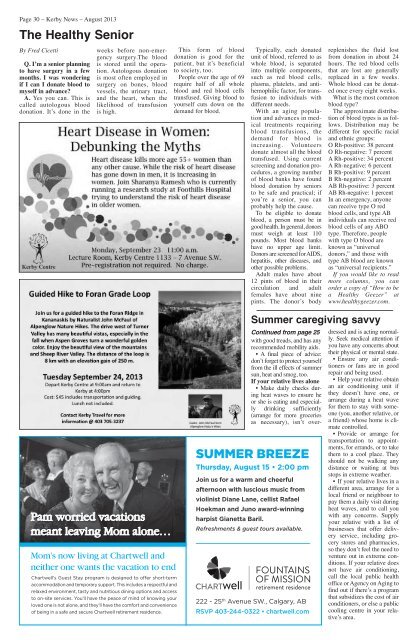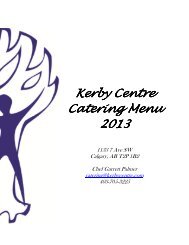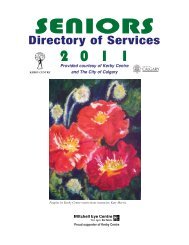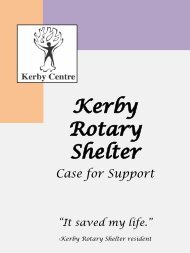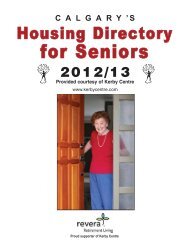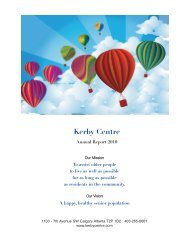Create successful ePaper yourself
Turn your PDF publications into a flip-book with our unique Google optimized e-Paper software.
Page 30 – <strong>Kerby</strong> News – August 2013The Healthy SeniorBy Fred CicettiQ. I’m a senior plann<strong>in</strong>gto have surgery <strong>in</strong> a fewmonths. I was wonder<strong>in</strong>gif I can I donate blood tomyself <strong>in</strong> advance?A. Yes you can. This iscalled autologous blooddonation. It’s done <strong>in</strong> theweeks before non-emergencysurgery.The bloodis stored until the operation.Autologous donationis most often employed <strong>in</strong>surgery on bones, bloodvessels, the ur<strong>in</strong>ary tract,and the heart, when thelikelihood of transfusionis high.This form of blooddonation is good for thepatient, but it’s beneficialto society, too.People over the age of 69require half of all wholeblood and red blood cellstransfused. Giv<strong>in</strong>g blood toyourself cuts down on thedemand for blood.Typically, each donatedunit of blood, referred to aswhole blood, is separated<strong>in</strong>to multiple components,such as red blood cells,plasma, platelets, and antihemophilicfactor, for transfusionto <strong>in</strong>dividuals withdifferent needs.With an ag<strong>in</strong>g populationand advances <strong>in</strong> medicaltreatments requir<strong>in</strong>gblood transfusions, thedemand for blood is<strong>in</strong>creas<strong>in</strong>g. Volunteersdonate almost all the bloodtransfused. Us<strong>in</strong>g currentscreen<strong>in</strong>g and donation procedures,a grow<strong>in</strong>g numberof blood banks have foundblood donation by seniorsto be safe and practical; ifyou’re a senior, you canprobably help the cause.To be eligible to donateblood, a person must be <strong>in</strong>good health. In general, donorsmust weigh at least 110pounds. Most blood bankshave no upper age limit.Donors are screened for AIDS,hepatitis, other diseases, andother possible problems.Adult males have about12 p<strong>in</strong>ts of blood <strong>in</strong> theircirculation and adultfemales have about n<strong>in</strong>ep<strong>in</strong>ts. The donor’s bodyreplenishes the fluid lostfrom donation <strong>in</strong> about 24hours. The red blood cellsthat are lost are generallyreplaced <strong>in</strong> a few weeks.Whole blood can be donatedonce every eight weeks.What is the most commonblood type?The approximate distributionof blood types is as follows.Distribution may bedifferent for specific racialand ethnic groups:O Rh-positive: 38 percentO Rh-negative: 7 percentA Rh-positive: 34 percentA Rh-negative: 6 percentB Rh-positive: 9 percentB Rh-negative: 2 percentAB Rh-positive: 3 percentAB Rh-negative: 1 percentIn an emergency, anyonecan receive type O redblood cells, and type AB<strong>in</strong>dividuals can receive redblood cells of any ABOtype. Therefore, peoplewith type O blood areknown as “universaldonors,” and those withtype AB blood are knownas “universal recipients.”If you would like to readmore columns, you canorder a copy of “How to bea Healthy Geezer” atwww.healthygeezer.com.❑❑❑❑Pam worried ❑ vacations❑meant leav<strong>in</strong>g Mom alone…Mom’s now liv<strong>in</strong>g at Chartwell andneither one wants the vacation to endChartwell’s Guest Stay program is designed to offer short-termaccommodation and temporary support. This <strong>in</strong>cludes a respectful andrelaxed environment, tasty and nutritious d<strong>in</strong><strong>in</strong>g options and accessto on-site services. You’ll have the peace of m<strong>in</strong>d of know<strong>in</strong>g yourloved one is not alone, and they’ll have the comfort and convenienceof be<strong>in</strong>g <strong>in</strong> a safe and secure Chartwell retirement residence.Summer caregiv<strong>in</strong>g savvySUMMER BREEZERefreshments & guest tours available.222 - 25 th Avenue SW., Calgary, ABCont<strong>in</strong>ued from page 25with good treads, and has anyrecommended mobility aids.• A f<strong>in</strong>al piece of advice:don’t forget to protect yourselffrom the ill effects of summersun, heat and smog, too.If your relative lives alone• Make daily checks dur<strong>in</strong>gheat waves to ensure heor she is eat<strong>in</strong>g and especiallydr<strong>in</strong>k<strong>in</strong>g sufficiently(arrange for more groceriesas necessary), isn’t overdressedand is act<strong>in</strong>g normally.Seek medical attention ifyou have any concerns abouttheir physical or mental state.• Ensure any air conditionersor fans are <strong>in</strong> goodrepair and be<strong>in</strong>g used.• Help your relative obta<strong>in</strong>an air condition<strong>in</strong>g unit ifthey doesn’t have one, orarrange dur<strong>in</strong>g a heat wavefor them to stay with someone(you, another relative, ora friend) whose home is climatecontrolled.• Provide or arrange fortransportation to appo<strong>in</strong>tments,for errands, or to takethem to a cool place. Theyshould not be walk<strong>in</strong>g anydistance or wait<strong>in</strong>g at busstops <strong>in</strong> extreme weather.• If your relative lives <strong>in</strong> adifferent area, arrange for alocal friend or neighbour topay them a daily visit dur<strong>in</strong>gheat waves, and to call youwith any concerns. Supplyyour relative with a list ofbus<strong>in</strong>esses that offer deliveryservice, <strong>in</strong>clud<strong>in</strong>g grocerystores and pharmacies,so they don’t feel the need toventure out <strong>in</strong> extreme conditions.If your relative doesnot have air condition<strong>in</strong>g,call the local public healthoffice or Agency on Ag<strong>in</strong>g tof<strong>in</strong>d out if there’s a programthat subsidizes the cost of airconditioners, or else a publiccool<strong>in</strong>g centre <strong>in</strong> your relative’sarea.


